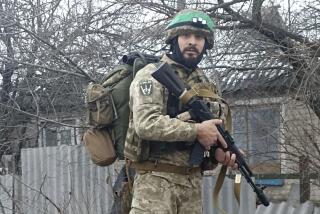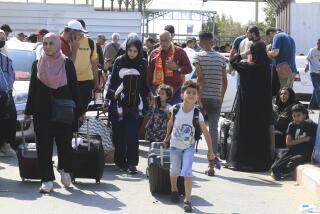NATO Rushes to Send Troops, Aid to Help Refugees
- Share via
BRUSSELS — As the tide of refugees forced from Kosovo swelled to stunning proportions, the NATO allies Saturday scrambled to commit troops and humanitarian aid to a massive relief effort.
The North Atlantic Treaty Organization announced plans to send 6,000 to 8,000 troops to Albania to assist in refugee operations and to set up a forward headquarters to provide logistic support for the relief effort.
Jamie Shea, NATO spokesman here, said Serbian forces on Saturday pushed another 130,000 ethnic Albanians out of the Serbian province of Kosovo, bringing to 765,000 the total displaced since the purge began in March.
He estimated that, at this pace, Serbian forces will have removed the province’s 1.8 million ethnic Albanians “in between 10 to 20 days from now.”
In one sign of the pressures being felt by Kosovo’s neighbors, Macedonia declared that it will not accept any ethnic Albanian refugees until the allies provide more help in dealing with the influx.
With long lines of refugees huddled at the borders, officials in Macedonia and other countries adjacent to the province expressed alarm that they soon would run out of enough food, water and sanitary facilities to cope with the hordes of displaced people, many of whom are now living outdoors in cold, wet weather.
In other developments:
* NATO missiles today struck the Yugoslav capital, Belgrade, for a second day in a row. Serbian civilian defense officials reported a police academy and a factory had been hit. On Saturday, NATO airstrikes destroyed two bridges across the Danube. The independent Beta news agency in Yugoslavia reported that seven people were injured, some seriously, in Novi Sad during the attack on one of the bridges.
* The Pentagon announced that it had ordered the U.S. aircraft carrier Theodore Roosevelt and a battle group of destroyers and frigates to the Adriatic to help bolster NATO forces. The carrier, with 78 aircraft, including 46 attack planes, is expected to arrive Monday.
* Serbian forces in Kosovo have been carrying out a series of massacres against ethnic Albanians in a triangle of territory in the southern part of the province, refugees fleeing the province say. In one incident, 70 men reportedly were slain beside a river. The reports have been partially corroborated by injuries of the survivors and by a videotape taken by Milaim Bellanica, 31, and smuggled out of the province. The videotape shows bodies that Bellanica said were men from his village of Krusa e Madhe who had been slain by Serbian forces.
* In Bosnia-Herzegovina, troops of the U.S.-led peacekeeping mission blew up a key stretch of railway near the Yugoslav border to block Serbian military movements into Montenegro, Yugoslavia’s smaller republic. Western leaders claim that Yugoslav President Slobodan Milosevic is plotting a coup against the pro-Western government of the republic.
* In his weekly radio address Saturday, President Clinton defended the NATO air campaign as “necessary and right,” saying the U.S. must “stand with all our NATO allies to see it through.” Clinton met with his top foreign policy advisors to discuss plans for widening the air campaign. He also spoke by telephone with British Prime Minister Tony Blair and several other allied leaders.
* The State Department said the United States, Britain, France, Italy and Germany had agreed to demand that any peace accord signed with Yugoslavia provide for the return of ethnic Albanian refugees to Kosovo under escort by NATO peacekeeping forces.
The statement, issued by foreign ministers of the five countries, marked the first time that the allies have committed troops to accompany refugees into Kosovo.
Western Governments Also Rushing Food
Faced with a mounting refugee crisis in the region, Western governments Saturday rushed food and supplies to Albania and Macedonia. An Air Force C-17 cargo plane flew from Dover Air Force Base, Del., with 30,000 high-calorie packaged meals destined for refugees in Albania. Over the next several days, military and Pentagon-contracted civilian planes are to ferry 500,000 meals to Albania, Pentagon spokesman Kenneth H. Bacon told a news conference.
The government of Macedonia--which already is sheltering 120,000 ethnic Albanians and is expected to face another 200,000 to 300,000 at its borders over the next several days--announced Saturday that it will only accept more refugees from Kosovo if they are in transit to another nation.
“The Republic of Macedonia cannot accept so many refugees,” said Deputy Prime Minister Radmila Kiprijanova. “It will threaten our security, disturb public order, cause economic collapse and political instability.”
Interior Minister Pavle Trajanov said the border would not be closed, but that “Macedonia will accept only as many refugees as other countries are willing to accept.”
Germany and Ireland said Saturday that they would be willing to accept some refugees, and U.S. officials said the Clinton administration is considering easing U.S. immigration policies to take in some Kosovars temporarily, but they declined to provide any details.
U.S. Envoy Assures Balkan Neighbors of Help
At Clinton’s direction, Deputy Secretary of State Strobe Talbott visited Albania on Saturday in an effort to assure countries adjacent to Kosovo that the Western alliance will help them cope with the throngs of displaced persons.
The flow of refugees into Macedonia increased dramatically from a few thousand a day to tens of thousands a day starting Wednesday when Serbs started a forced exodus from Kosovo by trains.
The Macedonian government has kept many of the recently arriving refugees penned into a valley just inside the Macedonian border as officials painstakingly registered each person. Macedonia reported Saturday that it had officially accepted 55,000 refugees and believes that tens of thousands more have come into the country without permission over recent weeks.
Conditions are bleak in the valley at the Blace border point, as the refugees tried to keep warm after several nights of being exposed to the rain and cold. International relief organizations reported that at least 26 people--mostly elderly and very young babies--had died in the crowd over the last few days.
“It is so horribly cold there,” said Kimete Koceli, a 17-year-old refugee from Pristina, the capital of Kosovo, who spent three nights at the border.
“I was so hungry and exhausted. First, Serb paramilitary with masks and guns chased us out of our homes. Then this terrible welcome in Macedonia. It makes it so much worse.”
Meanwhile, U.S. and NATO officials said that the missile attacks early Saturday against both Yugoslav and Serbian interior ministry headquarters buildings in Belgrade, during the first night of bombardments within the Yugoslav capital, had destroyed the facilities, apparently with few, if any, civilian casualties.
The structures were hit by seven Tomahawk cruise missiles fired by two U.S. warships in the Adriatic. The missiles are guided by satellite navigation receivers, which enable the weapons to reach their targets with precision accuracy.
NATO officials have complained that their bombing efforts have been hampered by the bad weather in the Balkans, which often leaves the local terrain shrouded by layers of clouds and fog. Cruise missiles, which receive satellite signals, are not affected by cloud cover.
The deployment of the Theodore Roosevelt battle group to the Adriatic was one of several moves requested by NATO’s supreme commander, U.S. Army Gen. Wesley K. Clark, who is heading the air campaign against Yugoslavia.
Clark also has asked the Pentagon to send in a group of Army Apache helicopters that could be used to hit Serb forces conducting “ethnic cleansing” operations in Kosovo, but the Pentagon so far has not agreed to do so.
A New Round of Protests From Russia
The extension of NATO’s bombing campaign to targets in downtown Belgrade drew a new round of protests from Russia, which condemned the NATO attacks and charged that the alliance was mounting a “ruthless war of extermination” against Yugoslavia.
“I do not know how reckless one would have to be to deliver these strikes,” said Col. Gen. Leonid Ivashov of the Defense Ministry on Saturday. “NATO is a criminal organization and it does not have a right to exist.”
A senior Russian military official warned that his country may withdraw its 1,400 peacekeepers deployed in Bosnia--part of a NATO-led force to police a 1995 peace treaty in that Balkan nation--in retaliation for the action.
As Moscow had announced several days ago, a Russian warship sailed through Istanbul’s strategic Bosporus strait on Saturday, heading for the Mediterranean, where it is expected to monitor NATO activities in a show of solidarity with the Belgrade government.
Russia has been trying to play both sides in the conflict, seeking to show solidarity with the Serbs, to whom they are related ethnically and religiously, and to avoid breaking relations with the West, which they need for political and financial support.
U.S. officials have been warily monitoring the pronouncements from Moscow, but so far they say privately they see no signs that the Russians are preparing to take any drastic steps, such as launching some sort of military action.
No Developments in Case of U.S. Captives
There were no new developments in the case of the three U.S. soldiers who were captured near the Macedonia border on Wednesday. The Yugoslav government has said it will put them on trial before a military tribunal, but has refused to permit outsiders to see them.
The three include one soldier from Los Angeles--24-year-old Staff Sgt. Andrew Ramirez. The other two are Staff Sgt. Christopher J. Stone, 25, of Smith’s Creek, Mich., and Spc. Steven Gonzales, 21, of Huntsville, Texas.
The three men, stationed in Macedonia as part of a U.S. Army force monitoring that nation’s border with Yugoslavia, were captured while driving their Humvee. It was not clear how they were taken or whether they were on Macedonian territory or had strayed into Yugoslavia.
Yugoslav Foreign Minister Zivadin Jovanovic on Saturday referred to the three soldiers as prisoners of war, the most authoritative reference yet by a top Yugoslav official to the term that confers on them protected status under the Geneva Conventions on the conduct of war.
The United States has insisted that they should be classified as prisoners of war and has protested that to put them on trial would be a violation of international law. The three appeared bruised in television footage from Yugoslavia shown shortly after their capture, but Belgrade officials say they are in good health.
*
Dahlburg reported from Brussels and Shogren from Skopje, Macedonia. Times staff writers Carol J. Williams in Sarajevo, Bosnia-Herzegovina, Robyn Dixon in Moscow, John Daniszewski in Kukes, Albania, Art Pine in Washington and Associated Press also contributed to this report.
More to Read
Sign up for Essential California
The most important California stories and recommendations in your inbox every morning.
You may occasionally receive promotional content from the Los Angeles Times.













